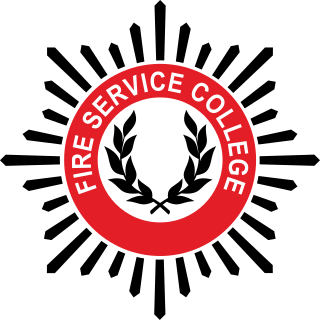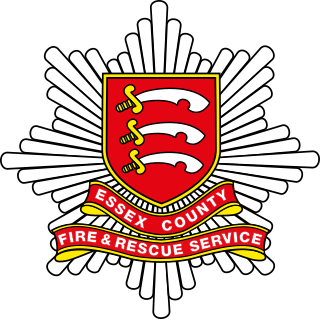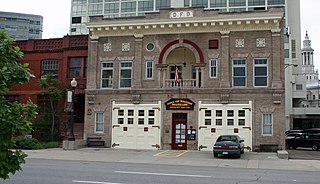
The Green Goddess is the colloquial name for the RLHZ Self Propelled Pump manufactured by Bedford Vehicles, a fire engine used originally by the Auxiliary Fire Service (AFS), and latterly held in reserve by the Home Office until 2004, and available when required to deal with exceptional events, including being operated by the British Armed Forces during fire-fighters’ strikes. These green-painted vehicles were built between 1953 and 1956 for the AFS. The design was based on a Bedford RL series British military truck.

A fire department or fire brigade, also known as a fire company, fire authority, fire district, fire and rescue, or fire service in some areas, is an organization that provides fire prevention and fire suppression services as well as other rescue services.

The New York City Fire Museum is a museum dedicated to the New York City Fire Department (FDNY) in the Hudson Square neighborhood of Manhattan, New York City. It is housed in the former quarters of the FDNY's Engine Company No. 30, a renovated 1904 fire house at 278 Spring Street between Varick and Hudson Streets.

The Singapore Civil Defence Force (SCDF) is a uniformed organisation in Singapore under the Ministry of Home Affairs that provides emergency services such as firefighting, technical rescue, and emergency medical services, and coordinates national civil defence programme.

James Braidwood (1800–1861) was a Scottish firefighter who was the first Master of Engines in the world's first municipal fire service in Edinburgh in 1824. He was also the first director of the London Fire Engine Establishment and is credited with the development of the modern municipal fire service.

The London Fire Brigade (LFB) is the fire and rescue service for London, the capital of the United Kingdom. It was formed by the Metropolitan Fire Brigade Act 1865, under the leadership of superintendent Eyre Massey Shaw. It has 5,992 staff, including 5,096 operational firefighters and officers based at 102 fire stations.
The Metropolitan Fire Brigade (MFB), also known as the Metropolitan Fire and Emergency Services Board, was a fire service in Victoria, Australia. The MFB provided firefighting, rescue, medical and hazardous material incident response services to the metropolitan area of Melbourne. The MFB's headquarters were located at the Eastern Hill Fire Station in East Melbourne.

The Fire Service College is responsible for providing leadership, management and advanced operational training courses for senior fire officers from the United Kingdom and foreign fire authorities. It is located at Moreton-in-Marsh in Gloucestershire, England. It has been owned by Capita since February 2013, having previously been an executive agency and trading fund of the Department for Communities and Local Government.
As firefighting has a rich history throughout the world, traditions in this profession vary widely from country to country.

The history of organized firefighting began in ancient Rome while under the rule of the first Roman Emperor Augustus. Prior to that, Ctesibius, a Greek citizen of Alexandria, developed the first fire pump in the third century BC, which was later improved upon in a design by Hero of Alexandria in the first century BC.

The Israel Fire and Rescue Services is the national Israeli fire and rescue organization. The organisation also provides rescue services from terror attacks, car accident and dangerous substance spillages, along with Magen David Adom, the National EMS. They are also involved in public education and awareness campaigns. The service is accessed by calling 102 from any phone. As of 2022, the commissioner of the services is Eyal Casspi.

Essex County Fire and Rescue Service (ECFRS) is the statutory fire and rescue service for the county of Essex in the east of England, and is one of the largest fire services in the country, covering an area of 1,338 square miles (3,470 km2) and a population of over 1.7 million people.

The history of fire brigades in the United Kingdom charts the development of fire services in the United Kingdom from the creation of the United Kingdom to the present day.

Norfolk Fire and Rescue Service (NFRS) is the statutory fire and rescue service for the county of Norfolk in the east of England. The county consists of around 870,100 people, covering the 4th largest area in England with 2,074 square miles including 200 miles of inland waterways, 90 miles of coastline and 6,125 miles of roads. The county city is Norwich with other major towns including Great Yarmouth, King's Lynn and Thetford. Norfolk has one of the 20 Urban Search and Rescue teams across England and Wales which were set up in response to the 9/11 attacks. The teams, including Norfolk, have the capacity to deal with two simultaneous incidents across the UK.

Suffolk Fire and Rescue Service (SFRS) is the statutory fire and rescue service covering the county of Suffolk in East Anglia, England. It was formed in 1948 as the Suffolk & Ipswich Fire Service, before changing after the 1974 Local Government Review to 'Suffolk Fire Service'. Following the 2004 Fire & Rescue Services Act, the service name was changed to Suffolk Fire & Rescue Service to better reflect its role. Suffolk has a population of 760,556 and covers 1,466 square miles (3,800 km2). The county town is Ipswich with other major towns including Lowestoft, Bury St-Edmunds, Felixstowe and Newmarket.

The Denver Firefighters Museum is a museum in downtown Denver, Colorado, United States. A nonprofit institution 501 (C) (3), it consists of an 11,000-square-foot (1,000 m2) facility housing four galleries that explore the history of firefighting in Denver. Established in 1978, it is located in the 1909-built former Fire Station No. 1, a building that is a Denver Landmark and has been listed on the National Register of Historic Places.

Fire services in the United Kingdom use a variety of fire appliances, which perform a wide range of general and specialised roles and fit into several distinct categories. Contemporary fire appliances carry a multitude of equipment and firefighting media to deal with different types of emergencies ranging from fires, rescues, vehicle extrication, floods, salvage, casualty and trauma care.

The Scottish Fire and Rescue Service (SFRS) is the national fire and rescue service of Scotland. It was formed by the merger of eight regional fire services in the country on 1 April 2013. It thus became the largest fire brigade in the United Kingdom, surpassing the London Fire Brigade.
Arthur "Smokestack" Hardy was a volunteer fire fighter, photographer, black fire historian and collector of fire memorabilia. He was the first African-American firefighter in Baltimore, Maryland. There is a museum of his collection of fire related artifacts in West Baltimore curated by Guy Cephas, a fellow Retired Auxiliary firefighter. Baltimore has named one of their fire stations after him.

The Penrith Museum of Fire is an Australian firefighting museum that contains heritage-listed former operating and stored for preservation fire service vehicles located in Penrith, Sydney, Australia. The provenance of the firefighting vehicles date from 1841 to 1998. The fleet of vehicles was added to the New South Wales State Heritage Register on 25 February 2013.

















